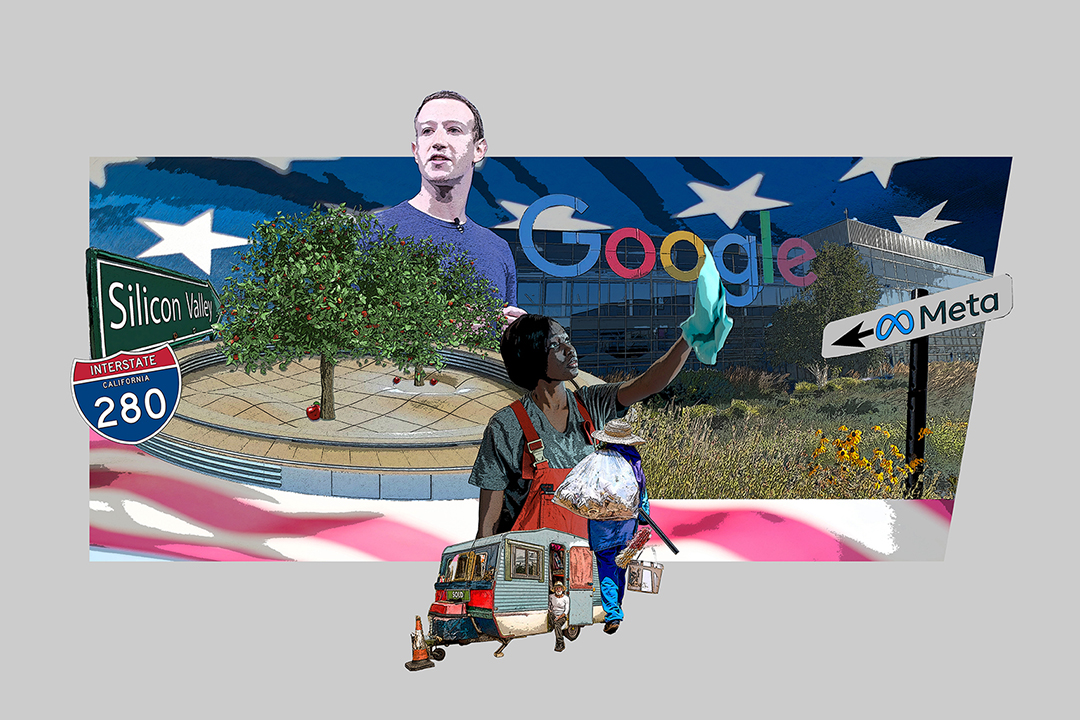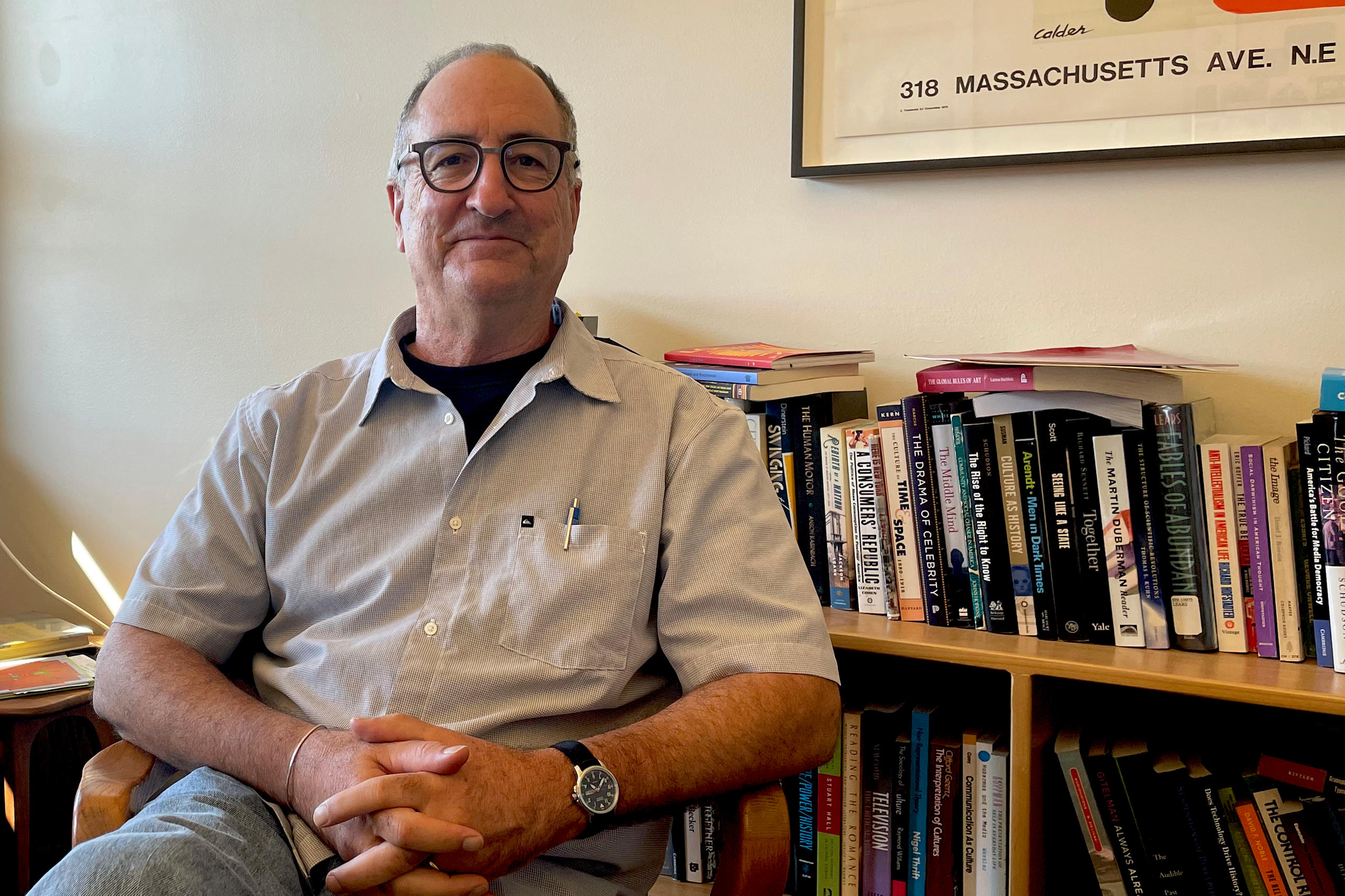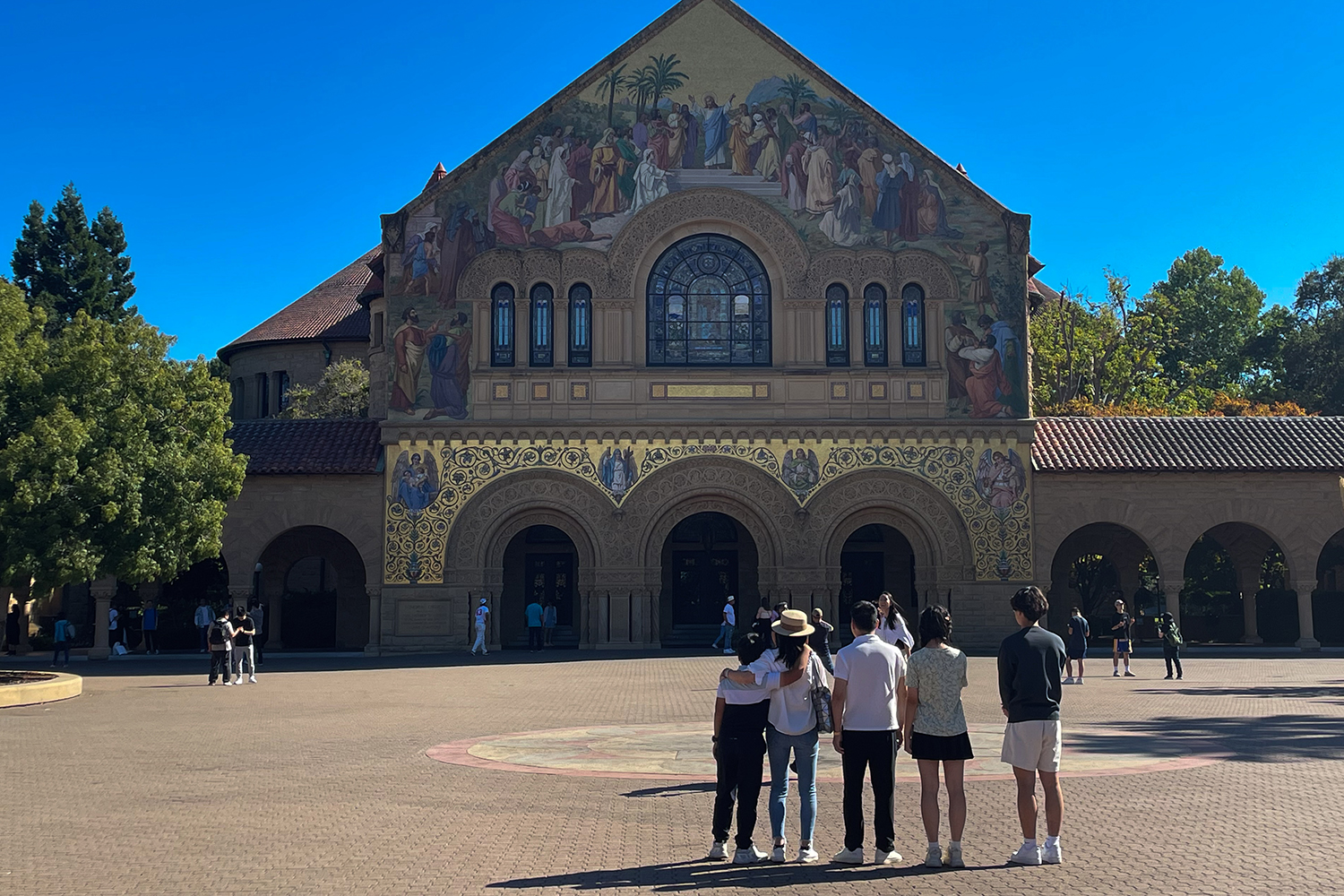
Innovating fairly: Switzerland’s lessons for Silicon Valley

A visit to Silicon Valley in California, home to the world's tech giants, reveals a stark contrast between unbridled innovation and deepening inequality. Can Switzerland's model offer solutions?
I only have to look out of the train window to see what success and wealth can buy in Silicon Valley: monotonous but modern houses with well-kept gardens and outdoor swimming pools. Upon my arrival in Palo Alto, home to the microchip and computer revolution, I see Teslas with tinted windows and well-dressed people whizzing by on electric scooters.
Today, this valley is not only full of “unicorns” – start-ups valued at over $1 billion (CHF850 million) – but also the headquarters of three of the five biggest tech companies in the world: Alphabet (owner of Google), Apple, and Meta (owner of Facebook). But wealth hasn’t benefited everyone equally.
Silicon Valley and Switzerland are both considered among the most innovative areas in the world. Why? What divides them and what brings them together? What can they learn from each other? In this series, we tell you about Silicon Valley through the eyes of the Swiss who experience its temptations, promises and contrasts up close.
Several motor homes are parked along the well-maintained road that runs near Stanford University, one of the richest and most expensive higher-education institutions in the world. Towards evening, entire families who cannot afford the prohibitive rents in the valley return to these homes on wheels. Some make ends meet by selling meals on campus, while others work as plumbers or staff for one of the tech companies. Many immigrated to the United States and don’t look like Mark Zuckerberg or Steve Jobs.
“It is a fantasy to think that only the Zuckerbergs are Silicon Valley. This is the kind of blindness we are trying to combat,” says Fred Turner, a professor of communication at Stanford. Thanks to these workers, the Big Tech empire can function day in and day out.

Listen to the full interview of Fred Turner on our podcast the Swiss Connection:
One in four Silicon Valley residents below the poverty line
A former journalist, Turner has been studying the impact of new media technologies on American culture for decades. In his office, which is somewhat reminiscent of the 1970s, books are scattered around the floor. My gaze falls on titles like Hannah Arendt’s “Humanity in Dark Times” and David Noble’s “The Religion of Technology”.
Turner is also among those most vocal in denouncing the injustices faced by people living and working in Silicon Valley. In 2018, Turner and photographer Mary Beth Meehan portrayed some of the most vulnerable people in the book Seeing Silicon Valley: Life inside a fraying America.External link
Workers who do not have a high school diploma earn on average $33,000 a year, at least three times lessExternal link than those with a university degree. And the gap is widening: in 2021, 23% of residents lived below the poverty line, 3% more than in 2019, according to the Silicon Valley IndexExternal link.
Despite this, many cities and countries, including Switzerland, are pursuing the “Silicon Valley dream” of rapid innovation and wealth creation. Dubbed the most innovative country in the world and the “Silicon Valley of robotics”, Switzerland has also sought to develop a hub for cryptocurrency and start-up culture. According to Turner, however, the Alpine nation doesn’t have much to learn from Silicon Valley.
If anything, Turner believes it’s the opposite: Switzerland could teach California’s innovation hub a thing or two about how to integrate Big Tech without sparking a housing or wealth-inequality crisis, based on a responsible model anchored in democratic institutions.
Silicon Valley: a history of exploitation
Starting in the 1800s, the area that is now Silicon Valley was developed on the backs of thousands of indigenous people who were deprived of their land and enslaved, as well as exploited foreign workers, especially Chinese and Mexicans. This laid the foundation for a white elite whose racism and disdain for market rules served as the key to their success. Even then, the prevailing mindset in the region suggested that if you are rich and have a big house, it is because you are talented and have earned it, writes journalist Malcolm Harry in his book Palo Alto: A History of California, Capitalism and the WorldExternal link.
The innovation hub of Silicon Valley began to take shape at the end of the Second World War and during the Cold War thanks to a fruitful collaboration between Stanford University, semiconductor companies and military research. This was the era when silicon chips moved from missiles to computers. From the 1960s, hippies and technologists joined forces in their vision of computers empowering individuals and serving the common good.
Today’s Silicon Valley tycoons still talk about “empowering people” and “creating community”, pushing for a business model with few rules. Meanwhile, the poor are getting poorer, and the rich are getting richer. “The dream of companies serving humanity has turned into a nightmare and Switzerland should not pursue it,” says Turner.
More technology, poverty, and precariousness
Artist and researcher Şerife Wong also thinks that the popular image of visionary geniuses who change the world from their garages is an illusion. “We are idealising the myth of the inventor, the American dream of the man who from nothing becomes super rich and changes the world for the better, but for the better for whom?” asks Wong, who studies the social implications of emerging technologies. She is also an affiliate research scientist at the University of California, Berkeley.
Wong and I are sitting outside a café in San Francisco, not far from Chinatown, the day before my meeting with Turner at Stanford. As we talk, a homeless woman sits at a nearby table and takes off most of her clothes. Just then, an orange-and-white driverless car rolls to a stop at an intersection, waiting for pedestrians to cross. San Francisco was one of the first cities in the world to test self-driving cars and delivery robots. And what did people get out of it?

“They become poorer and their jobs more precarious,” says Wong. She cites the example of drivers without health insurance who depend on Uber’s opaque algorithms and struggle to make ends meet. African-American and Latino families are particularly affected by poverty.
Listen to the full interview of Şerife Wong on our podcast the Swiss Connection:
Switzerland: high innovation, low inequality
In this sense, Europe would have something to teach America. Countries like France and Germany, cornerstones of the European Union, could become models of how strong social systems and common rules can bend technology in the service of democracy and not the other way around, says Turner.
He thinks that Switzerland, with its unique geography and decentralised but democratic institutions, could also serve as a model. The country invests heavily in public education (16%External link compared to 10%External link in the US) and even its world-renowned universities are government-funded and accessible to all social classes.
“A country with high levels of innovation but low levels of inequality like Switzerland has very little to learn from Silicon Valley,” argues Turner. In fact, Switzerland has topped the Global Innovation Index ranking for 13 consecutive years. Moreover, it is one of the most egalitarian countries in the world in terms of income distribution, although wealth is increasingly concentrated in a few hands.
Like Silicon Valley, the city of Zurich is also home to several big tech companies and has one of the highest per-capita GDPs in the world. But here, 7% of the populationExternal link is considered poor, the lowest rate in Switzerland.
Caspar Hirschi, a professor of the history of science and innovation at the University of St. Gallen, agrees that Switzerland should not imitate Silicon Valley. However, he sees the limits of the Swiss system, which is dominated by a few large companies with a lot of power, both politically and socially. “No economic system is democratic,” Hirschi wrote via email.
The difference, according to Hirschi, is that Swiss businesspeople are more discreet and less egomaniacal than those in Silicon Valley. They value stability and therefore do not delegitimise democracy. Moreover, the existence of market rules and a welfare state obliges them to contribute to the common good.

Switzerland’s lesson for Silicon Valley
Turner of Stanford University is convinced that Switzerland’s foundations in democracy will allow it to innovate without succumbing to the same inequality pitfalls as Silicon Valley. Again, he sees a lesson in it for his country.
“In 1945, the United States brought democracy back to your continent. It is time for you to return the favour,” he says.
As our conversation draws to a close, Turner says he wants to show me something. Leaving his office, we head to the Stanford Cathedral, which Jane Stanford had built in memory of her husband Leland. Together, they founded the university in 1885, on a plot of land where a farm and ranch once stood. No one would have imagined at the time that this desolate countryside would one day become synonymous with innovation and would so profoundly shape the world.
Edited by Sabrina Weiss and Veronica De Vore.

In compliance with the JTI standards
More: SWI swissinfo.ch certified by the Journalism Trust Initiative








































You can find an overview of ongoing debates with our journalists here . Please join us!
If you want to start a conversation about a topic raised in this article or want to report factual errors, email us at english@swissinfo.ch.